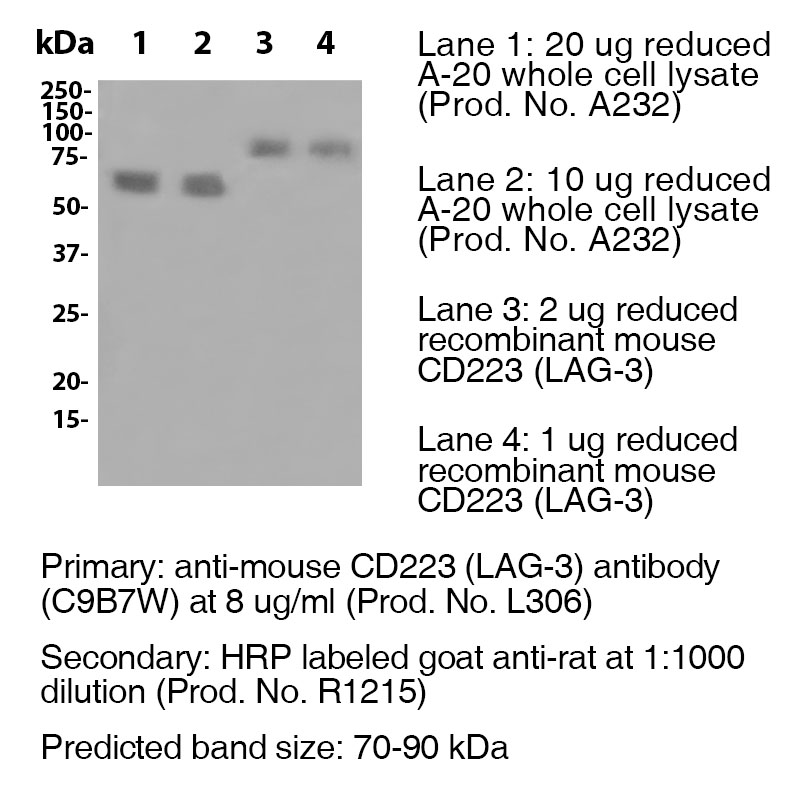Anti-Mouse CD223 (LAG-3) [C9B7W] – Purified in vivo GOLD™ Functional Grade
Anti-Mouse CD223 (LAG-3) [C9B7W] – Purified in vivo GOLD™ Functional Grade
Product No.: L306
- -
- -
Clone C9B7W Target CD223 Formats AvailableView All Product Type Monoclonal Antibody Alternate Names CD223, LAG3 Isotype Rat IgG1 κ Applications B , FA , FC , in vivo , IP , WB |
Data
- -
- -
Antibody DetailsProduct DetailsReactive Species Mouse Host Species Rat Recommended Isotype Controls Recommended Isotype Controls Recommended Dilution Buffer Immunogen Murine CD223-Ig fusion protein Product Concentration ≥ 5.0 mg/ml Endotoxin Level < 1.0 EU/mg as determined by the LAL method Purity ≥95% monomer by analytical SEC ⋅ >95% by SDS Page Formulation This monoclonal antibody is aseptically packaged and formulated in 0.01 M phosphate buffered saline (150 mM NaCl) PBS pH 7.2 - 7.4 with no carrier protein, potassium, calcium or preservatives added. Due to inherent biochemical properties of antibodies, certain products may be prone to precipitation over time. Precipitation may be removed by aseptic centrifugation and/or filtration. Product Preparation Functional grade preclinical antibodies are manufactured in an animal free facility using in vitro cell culture techniques and are purified by a multi-step process including the use of protein A or G to assure extremely low levels of endotoxins, leachable protein A or aggregates. Storage and Handling Functional grade preclinical antibodies may be stored sterile as received at 2-8°C for up to one month. For longer term storage, aseptically aliquot in working volumes without diluting and store at ≤ -70°C. Avoid Repeated Freeze Thaw Cycles. Country of Origin USA Shipping Next Day 2-8°C RRIDAB_2737552 Additional Applications Reported In Literature ? B LAG-3 antibody (clone C9B7W) blocks the function of murine LAG-3 in vivo. Each investigator should determine their own optimal working dilution for specific applications. See directions on lot specific datasheets, as information may periodically change. DescriptionDescriptionSpecificity LAG-3 antibody (clone C9B7W) recognizes and specifically binds to an epitope in the D2 domain of CD223. Background LAG-3 is a 70-kD, type-I transmembrane glycoprotein within the Ig superfamily with four extracellular Ig-like domains (D1 to D4) and is structurally homologous to CD4. LAG-3 is a cell surface molecule with various biologic effects on T cell function. It has been reported to be involved in Treg suppressive function. It negatively regulates cellular proliferation, activation, and homeostasis of T cells, in a similar manner to CTLA-4 and PD-1. Human LAG-3 is approximately 70% homologous with murine LAG3, and it binds MHC class II molecules with higher affinity than CD4. As an immune checkpoint receptor, LAG-3 is the target of various drug development programs seeking to expand treatments for cancer and autoimmune disorders. In its soluble form, LAG-3 is being developed as a cancer drug. As an antagonist, LAG-3 antibody can activate T effector cells via the downregulation of the LAG-3 inhibiting signal into pre-activated LAG-3+ cells. In addition, it can inhibit antigen-specific Treg suppressive activity. As an agonist antibody, it can be used to diminish an autoimmune response and is currently being investigated for the treatment of plaque psoriasis. Antigen Distribution CD223 (LAG-3) is expressed on T regulatory cells, activated T cells and NK cells. NCBI Gene Bank ID UniProt.org Research Area Immunology . Inhibitory Molecules References & CitationsTechnical ProtocolsCertificate of Analysis |
Related Products
- -
- -
Prod No. | Description |
|---|---|
S211 | |
R1364 | |
I-1195 | |
C247 | |
F1175 | |
R1214 | |
S571 |
Formats Available
- -
- -
Prod No. | Description |
|---|---|
C2252 | |
C2253 | |
C2254 | |
C2255 | |
C2256 | |
C2249 | |
C2251 | |
C2250 | |
L306 | |
C2155 | |
L502 | |
C2852 | |
L313 | |
L310 |



